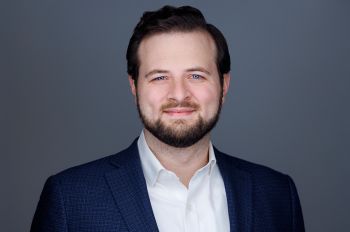Student’s Article on Countering the “Equal Opportunity Harasser” Defense wins Multiple Writing Awards

A Chicago-Kent College of Law student has won a pair of notable writing awards for her paper on how a recent United States Supreme Court case could weaken a peculiar sexual harassment defense made by “equal opportunity harassers.”
Katherine Hanson ’22 was named as the 2021 winner of the Mary Rose Strubbe Labor & Employment Writing Prize and placed second in the Louis Jackson Memorial National Student Writing Competition for her paper, entitled “Conduct, Causation, and Comparators: Revisiting the Defense of the Equal Opportunity Harasser After Bostock.”
“Bostock” refers to a 2020 Supreme Court Case Bostock v. Clayton County, Georgia, which determined that Title VII protects individuals against discrimination based on gender identity or sexual orientation discrimination. Title VII of the 1964 Civil Rights Act is a federal law protecting employees against discrimination based on a number of factors, including “sex.” The Bostock case covered three separate appellate cases alleging various types of sex discrimination.
Hanson says she chose the topic while doing an externship with the United States Equal Employment Opportunity Commission (EEOC) last fall. While reviewing model jury instructions for the U.S. Federal Seventh and Eighth Circuits, she noticed a footnote identifying a difference between circuits over the “equal opportunity sexual harasser,” which piqued her interest.
An equal opportunity sexual harasser describes an employer who, in effect, harasses both men and women at work. The term has led to a defense that Hanson saw as frustrating.
“The idea is that if you treat both sexes badly, you’re not discriminating,” she says. So plaintiffs lose their claim under Title VII.
The circuit courts remain split on how they analyze the defense—partly because, Hanson argues, “There is actually very little legislative history when we try to figure out the legal definition of ‘sex.’”
In sex discrimination claims, courts often use “comparators,” or examples of a sex difference, to show that an employer treated one group worse than another. Historically, common comparators were of the opposite sex of the plaintiff. However, when analyzing the equal opportunity sexual harasser, some courts, like Illinois’s Seventh Circuit, have determined that Title VII does not apply when both a male and female allege sexual harassment by the same supervisor. Technically, the court reasoned, the supervisor is not discriminating on the basis of “sex.”
But Hanson saw that simple binary difference in comparators as lacking. What if a supervisor discriminated against both homosexual women and heterosexual men, for example?
Enter Bostock. “Bostock expands the definition of discrimination to also include gender identity and orientation. It expands the how we use ‘sex,’ in analysis,” Hanson says.
Hanson argues that this standard could be used to broaden plaintiffs’ arguments against “equal opportunity harassers.”
“Now you have a ton of combinations, a ton of ways you can define your plaintiff in contrast to comparators,” Hanson says. “My argument is that because of Title VII’s broader applicability, we can pull these disparate treatment definitions from Bostock into cases involving sexual harassment to start to close this loophole of the ‘equal opportunity harasser.’” Hanson also notes that the language of Bostock seems to directly address the “equal opportunity harasser” as well.
Professor Elizabeth De Armond, who, as Chicago-Kent’s legal writing director, organized the Strubbe competition’s blind-judging panel, says, “Hanson’s article thoroughly analyzes both Bostock and the inconsistent court decisions, and shows how the Supreme Court’s reasoning in Bostock can rationally and justly resolve those inconsistencies.”
Michael Oswalt, interim director of the Institute for Law and the Workplace, says Hanson’s article “shows how one of the most important advances in workplace legal justice can, and should, reverberate across other areas of employment law for years to come. Her elegant writing and incisive analysis make it a joy to read.”
Before coming to Chicago-Kent, Hanson owned a hair salon. From the salon chair, women would confide in her, talking about the discrimination they’d experienced on their jobs as women. As a working single mother, she could relate; she started at Chicago-Kent intending to focus on labor and employment law.
“Listening to their stories wasn’t enough anymore,” Hanson says. “I felt like I could do more than I was doing.”
Hanson is the current editor-in-chief of the Chicago-Kent Law Review, and has completed externships with U.S. District Court Judge John Robert Blakey, the EEOC, and Chicago-Kent’s Plaintiffs Employment Law Clinic. She was also awarded a 2021 Justice John Paul Stevens Public Interest Fellowship to work for the Illinois Human Rights Commission.
The Strubbe Prize is awarded annually for the best piece of legal writing in labor and employment law by a Chicago-Kent student. Strubbe graduated with honors from Chicago-Kent in 1981 and worked in private practice before returning to the college in 1994 to teach and direct the Legal Research and Writing Program. Following Strubbe’s retirement in 2017, the Chicago Federation of Labor, faculty, and alumni joined together to establish the $5,000 prize.
The Louis Jackson Memorial National Student Writing Competition recognizes the best legal writing in the field of labor and employment law among current law students. The five judges are preeminent legal scholars at schools across the country, and entries undergo doubly anonymous review. The contest is underwritten by Jackson Lewis P.C. and administered by the Institute for Law and the Workplace. The second-place prize is a $1,000 scholarship.



